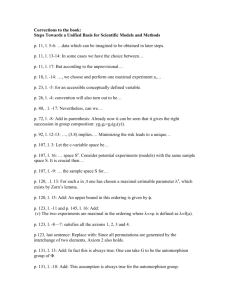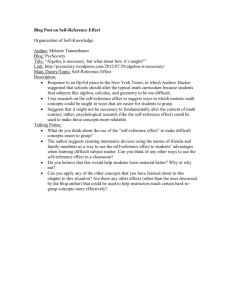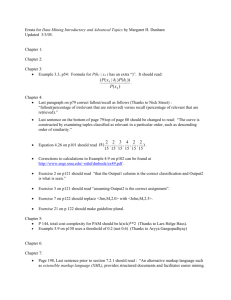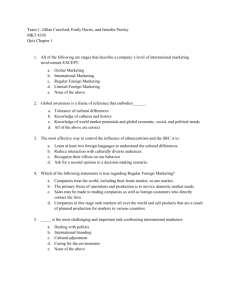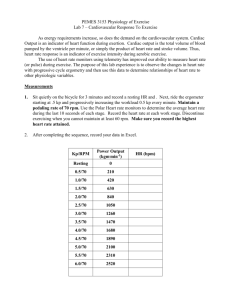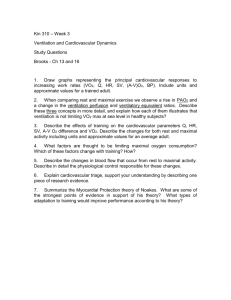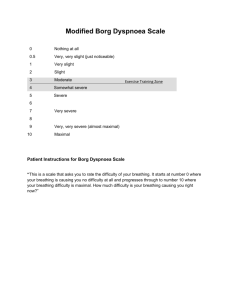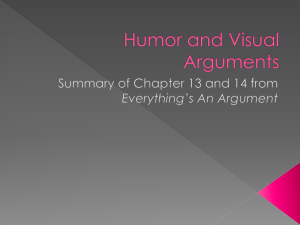Things that can be made into themselves
advertisement
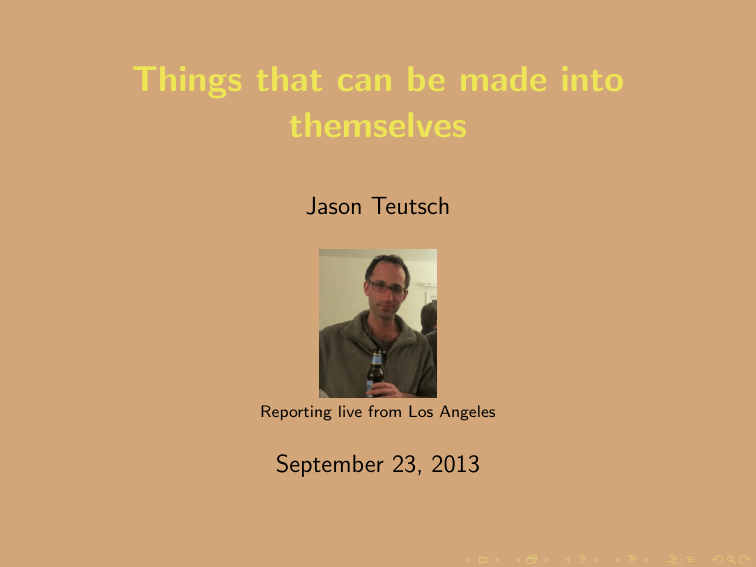
Things that can be made into
themselves
Jason Teutsch
Reporting live from Los Angeles
September 23, 2013
Humor and self-reference
Making things into themselves
Minimal and maximal sets
Humor
Self-reference
The birth of mirth
Previous work has shown that algorithms can be used to characterize
random sequences.
Question
Can we use computers to identify humorous expressions?
While there is no absolute notion of “humor,” clearly some formulas
are more humorous than others.
Example
Let < 0.
We wish to capture the notion of humor in formal languages so that
computers can process funny things from the Internet as well as
generate comedies.
Jason Teutsch
Things that can be made into themselves
Humor and self-reference
Making things into themselves
Minimal and maximal sets
Humor
Self-reference
Computational semantics
Some forms of humor require and exploit ambiguity.
Example
Is it funny to add the phrase, “That’s what she said” to the end of a
given sentence? Kiddon and Brun show that computers can do better
than just search for sentence words which women are likely to use.
Kao, Levy, and Goodman investigated computer identification of
puns, e.g.
“The magician got so mad he pulled his hare out.”
Can we substitute ambiguity with self-reference?
“The magician got so mad he pulled himself out.”
We would like to mix syntax and semantics by applying self-reference.
Jason Teutsch
Things that can be made into themselves
Humor and self-reference
Making things into themselves
Minimal and maximal sets
Humor
Self-reference
A strange phenomenon
Dougherty’s Paradox
There are infinitely many infinite sets, but
there are not finitely many finite sets.
The infinite sets “can be made into themselves,” but the finite sets
cannot. We explore this self-referential mixing of syntax and
semantics in the context of recursion theory.
Definition
We write A ≤lex B if either A = B or the least element x of the
symmetric difference satisfies x ∈ B.
We do not identify the characteristic sequence 10000000 . . . with
01111111 . . . .
Jason Teutsch
Things that can be made into themselves
Humor and self-reference
Making things into themselves
Minimal and maximal sets
Humor
Self-reference
Enumerations of left-r.e. sets (not reals)
Definition
A set A is left-r.e. iff there is a uniformly recursive approximation
A0 , A1 , . . . of A such that As ≤lex As+1 for all s.
Definition
A left-r.e. numbering α is a recursive function from natural numbers
to left-r.e. sets given by
e 7→ lim αe,s = αe
s→∞
where
αe,s is a recursive set, uniform in e and s, and
αe,s ≤lex αe,s+1 for all s.
Jason Teutsch
Things that can be made into themselves
Humor and self-reference
Making things into themselves
Minimal and maximal sets
Humor
Self-reference
Universal left-r.e. numberings
Definition
A left-r.e. numbering is called universal if its range includes all
left-r.e. sets.
Suppose
α0 , α1 , α2 , α3 , α4 , α5 , α6 , α7 , α8 , α9 , α10 , α11 , α12 , α13 , α14 , α15 , . . .
is a universal left-r.e. numbering. Some of the αi ’s will be Martin-Löf
random, say α1 , α7 , α15 , . . . .
Question
Is {1, 7, 15, . . . } a Martin-Löf random set?
Jason Teutsch
Things that can be made into themselves
Humor and self-reference
Making things into themselves
Minimal and maximal sets
Humor
Self-reference
Universal left-r.e. numberings
Definition
A left-r.e. numbering is called universal if its range includes all
left-r.e. sets.
Suppose
α0 , α1 , α2 , α3 , α4 , α5 , α6 , α7 , α8 , α9 , α10 , α11 , α12 , α13 , α14 , α15 , . . .
is a universal left-r.e. numbering. Some of the αi ’s will be Martin-Löf
random, say α1 , α7 , α15 , . . . .
Question
Is {1, 7, 15, . . . } a Martin-Löf random set?
Jason Teutsch
Things that can be made into themselves
Humor and self-reference
Making things into themselves
Minimal and maximal sets
Humor
Self-reference
Making things into themselves
Definition
A class of sets C can be made into itself if there exists a universal
left-r.e. numbering α such that
{e : αe ∈ C} ∈ C.
For example, consider singleton classes. A singleton left-r.e. class
{A} can be made into itself if there exists a universal left-r.e.
numbering β such that
{e : βe = A} = A.
Jason Teutsch
Things that can be made into themselves
Humor and self-reference
Making things into themselves
Minimal and maximal sets
Randomness notions
Singletons
Indifferent sets
Randoms can be random
Theorem (Stephan, Teutsch)
The Martin-Löf random sets can be made into themselves.
The same is true for the classes of:
computably randoms,
Schnorr randoms,
Kurtz randoms,
bi-immune sets
immune sets,
nonrecursive sets.
On the other hand,
Theorem (Stephan, Teutsch)
The left-r.e. Martin-Löf random sets cannot be made into themselves.
The random set witnessing that the Martin-Löf randoms get made
into themselves cannot be Chaitin’s Ω, but it can be K -recursive.
Jason Teutsch
Things that can be made into themselves
Humor and self-reference
Making things into themselves
Minimal and maximal sets
Randomness notions
Singletons
Indifferent sets
genericity
A set of binary strings A is called dense if for every string σ there
exists τ ∈ A extending σ.
Definition
A set is weakly 1-generic if it has a prefix in every dense r.e. sets of
binary strings.
Theorem (Stephan, Teutsch)
The weakly 1-generic sets can be made into themselves.
Theorem (Stephan, Teutsch)
No left-r.e. numbering makes both the weakly 1-generic sets into
themselves and the Martin-Löf random sets into themselves.
Jason Teutsch
Things that can be made into themselves
Humor and self-reference
Making things into themselves
Minimal and maximal sets
Randomness notions
Singletons
Indifferent sets
Things which cannot be made into themselves
The finite sets is not the only class which cannot be made into itself.
Lemma (Stephan, Teutsch)
The following classes have no left-r.e. numbering:
the non-r.e. left-r.e. sets,
the non-recursive left-r.e. sets.
Although somewhat disappointing, we get the following consequence.
Corollary (Stephan, Teutsch)
The following classes cannot be made into themselves:
the r.e. sets,
the co-r.e. sets, and
the recursive sets.
Jason Teutsch
Things that can be made into themselves
Humor and self-reference
Making things into themselves
Minimal and maximal sets
Randomness notions
Singletons
Indifferent sets
garden variety numberings
Definition
A left-r.e. numbering α is called acceptable if for every left-r.e.
numbering β there exists a recursive function f such that αf (e) = βe
for all e.
A set A is called autoreducible if for all x, whether x is a member of A
can be effectively determined by querying A at positions other than x.
Proposition (Stephan, Teutsch)
Any acceptable left-r.e. numbering
makes the following classes into
themselves:
but not these:
the autoreducible sets,
the non-autoreducible sets,
the non-random sets,
the random sets.
Jason Teutsch
Things that can be made into themselves
Humor and self-reference
Making things into themselves
Minimal and maximal sets
Randomness notions
Singletons
Indifferent sets
Singleton classes
Theorem (Stephan, Teutsch)
Let α be an acceptable universal left-r.e. numbering. Then for every
set B, {e : αe = B} =
6 B.
The singleton classes which can be made into themselves admit a
nice characterization.
Theorem (Stephan, Teutsch)
A singleton left-r.e. class {A} can be made into itself iff A 6= ∅ and
there exists an infinite, r.e. set B such that A ∩ B = ∅.
Jason Teutsch
Things that can be made into themselves
Humor and self-reference
Making things into themselves
Minimal and maximal sets
Randomness notions
Singletons
Indifferent sets
Indifferent sets
Definition (Figueira, Miller, Nies)
An infinite set I is called indifferent for a set A with respect to C if
for any set X ,
X 4A ⊆ I =⇒ X ∈ C.
Theorem (Figueira, Miller, Nies)
Every low Martin-Löf random set has an infinite co-r.e. set which is
indifferent with respect to the class of Martin-Löf randoms.
Can the same hold for left-r.e. random sets?
Question (Figueira, Miller, Nies)
Does Chaitin’s Ω have an infinite co-r.e. set which is indifferent for
the class of Martin-Löf randoms?
Jason Teutsch
Things that can be made into themselves
Humor and self-reference
Making things into themselves
Minimal and maximal sets
Randomness notions
Singletons
Indifferent sets
A partial solution
In order to make things into themselves, we add “retraceable” to the
result of Figueira, Miller, and Nies.
Definition
A set A = {a0 < a1 < a2 < · · · } is retraceable if there exists a
partial-recursive function f satisfying f (an+1 ) = an for all n.
The result then becomes:
Theorem (Stephan, Teutsch)
Every low Martin-Löf random set has a co-r.e. indifferent set which is
retraceable by a recursive function.
It is impossible to replace “low” with “left-r.e.” in the above theorem.
Jason Teutsch
Things that can be made into themselves
Humor and self-reference
Making things into themselves
Minimal and maximal sets
The r.e. case
The left-r.e. case
Extrema and things
Post’s Problem
In the beginning, recursion theorists only knew of enumerable objects
which were similar to the halting set, K .
Question (Post, 1944)
Does there exist a nonrecursive r.e. set A with Turing degree
below K ?
A set is called immune if it is infinite but contains no r.e. subset.
An r.e. set is simple if its complement is immune.
Post introduced simple sets as having “thin” complement with
many-one degree strictly below K .
By making even thinner complements, he proposed to get an r.e.
set with Turing degree strictly below K .
Jason Teutsch
Things that can be made into themselves
Humor and self-reference
Making things into themselves
Minimal and maximal sets
The r.e. case
The left-r.e. case
Extrema and things
Almost everywhere equal
Notation
We write
A ⊆∗ B if almost all elements of A are members of B, and
A ⊂∗ B if A ⊆∗ B and also B − A is infinite.
Myhill first investigated the structure of r.e. sets under ⊂∗ .
Definition
An r.e. set M is called minimal r.e. if
∅ ⊂∗ M, and
there is no r.e. set E with ∅ ⊂∗ E ⊂∗ M.
Unforutnately, minimal r.e. sets do not exist: one can always
enumerate every other element of a given r.e. set.
Jason Teutsch
Things that can be made into themselves
Humor and self-reference
Making things into themselves
Minimal and maximal sets
The r.e. case
The left-r.e. case
Extrema and things
Post’s program fails
Definition (Myhill, 1956)
An r.e. set M is maximal r.e. if
M ⊂∗ N, and
there is no r.e. set E with M ⊂∗ E ⊂∗ N.
Theorem (Friedberg, 1958)
There exists a maximal r.e. set.
Theorem (Lachlan 1968, Yates 1965)
A maximal set can be Turing complete.
This destroys Post’s Program: maximal sets have the thinnest
possible complement among infinite r.e. sets.
Jason Teutsch
Things that can be made into themselves
Humor and self-reference
Making things into themselves
Minimal and maximal sets
The r.e. case
The left-r.e. case
Extrema and things
Operations on r.e. and left r.e. sets
Similarities and differences.
r.e. sets
closed under join
X
closed under complement
×
closed under intersection
X
closed under union
X
left-r.e. sets
X
×
×
×
Proposition
Either Chaitin’s Ω intersected with either the even numbers or Ω
intersected with the odd number is not left-r.e.
Proof.
Otherwise the initial segment complexity of Ω would have sublinear
order. Observe which half converges faster on each prefix of Ω.
Jason Teutsch
Things that can be made into themselves
Humor and self-reference
Making things into themselves
Minimal and maximal sets
The r.e. case
The left-r.e. case
Extrema and things
Maximal and minimal left-r.e. sets
Definition (Stephan, Teutsch)
A left-r.e. set M is minimal
A left-r.e. set M is maximal
left-r.e. if
left-r.e. if
∅ ⊂∗ M, and
M ⊂∗ N, and
there is no left-r.e. set E
there is no left-r.e. set E
∗
∗
with ∅ ⊂ E ⊂ M.
with M ⊂∗ E ⊂∗ N.
Theorem (Stephan, Teutsch)
Maximal left-r.e. sets exist. Minimal left-r.e. exist, too.
Theorem (Stephan, Teutsch)
An r.e. set cannot be maximal left-r.e.
Jason Teutsch
Things that can be made into themselves
Humor and self-reference
Making things into themselves
Minimal and maximal sets
The r.e. case
The left-r.e. case
Extrema and things
Cohesive sets
Definition
An infinite set C is cohesive if for every r.e. set X either C ∩ X or
C ∩ X is finite.
Proposition
An set is r.e. maximal iff its complement is cohesive.
By the theorem of Friedberg, cohesive sets exist. An analogous class
for left-r.e. sets fails to exist.
Theorem (Stephan, Teutsch)
Let A be any infinite left-r.e. set. Then there exists an infinite
left-r.e. set E such that A ∩ E and A ∩ E are both infinite.
Jason Teutsch
Things that can be made into themselves
Humor and self-reference
Making things into themselves
Minimal and maximal sets
The r.e. case
The left-r.e. case
Extrema and things
Maximal and minimal singletons
Theorem (Stephan, Teutsch)
There is a minimal left-r.e. set A such that {A} can be made into
itself, but there is no maximal left-r.e. set B such that {B} can be
made into itself.
Proof (maximal case).
By the theorem on singleton classes, it suffices to show that there is
no infinite recursive set R disjoint from B. We may assume B ∪ R is
coinfinite because otherwise B is the complement of a recursive set
and not maximal. Let B0 , B1 , . . . be a left-r.e. approximation of B.
Now one can select a sequence of stages s0 , s1 , . . . such that
Bst ∩ {0, 1, . . . , t} is disjoint from R. Hence
Et = (Bst ∩ {0, 1, . . . , t}) ∪ R is a recursive left-r.e. approximation of
B ∪ R which witnesses that B is not a maximal left-r.e. set.
Jason Teutsch
Things that can be made into themselves
Humor and self-reference
Making things into themselves
Minimal and maximal sets
The r.e. case
The left-r.e. case
Extrema and things
Maximal and minimal classes
Theorem (Stephan, Teutsch)
Neither the class of minimal left-r.e. sets nor the class of maximal
left-r.e. sets can be made into itself.
Proof (maximal case).
Let B be a maximal let-r.e. set and let Q be the index set of the
maximal left-r.e. sets in a given numbering α. Now each join B ⊕ We
is left-r.e. and is a maximal left-r.e. set iff We is cofinite. There exists
is a K 0 -recursive mapping which finds for each e an index d with
B ⊕ We = αd ; hence one can, relative to K 0 , many-one reduce the
index set of the cofinite sets to Q. As the index set of the cofinite
sets is not K 0 -recursive, Q also cannot be K 0 -recursive; hence Q
cannot be left-r.e. and in particular is not a maximal left-r.e. set.
Jason Teutsch
Things that can be made into themselves
THE END. Thanks!
Jason Teutsch
Things that can be made into themselves
The r.e. inclusion problem is
INCϕ = hi, ji : Wiϕ ⊆ Wjϕ }.
Kummer showed that there is a numbering which makes the inclusion
problem recursive in the halting set and asked whether the inclusion
problem can be r.e. We get a negative answer for the left-r.e. case.
Theorem
For every universal left-r.e. numbering α,
1 INCα is not r.e. and
2 INCα ≥T K .
Question
Does there exist a numbering α for the left-r.e. sets such that
INCα ≡T K ? In particular, can we make INCα to be left-r.e.?
Jason Teutsch
Things that can be made into themselves
Complexity of the lexicography problem
Consider the related relation
LEXα = {hi, ji : αi ≤lex αj }.
Any Friedberg numbering α makes LEXα recursive in the halting set.
Moreover,
Theorem
There exists a universal left-r.e. numbering α such that LEXα is an
r.e. relation.
Jason Teutsch
Things that can be made into themselves
